Grand Exchange
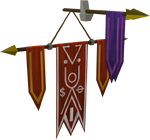
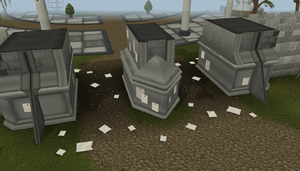
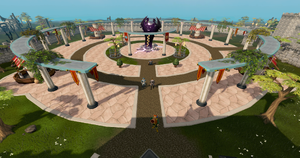
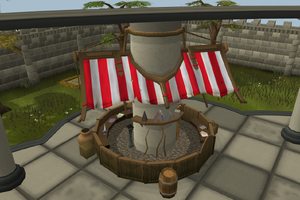
The "Grand Exchange" (also abbreviated as GE or G.E.) is a trading system for players to buy and sell from each other almost every tradeable item. Members get six spaces in which they may trade items, but free players are limited to two. Traders don't need to advertise, meet each other, or even wait at the Grand Exchange for their trades to finish. All coins and items from fully and partly finished trades are collectable at any bank, but not at bank chests (Except the one in Burthorpe, the Clan Wars and Castle Wars lobby) or deposit boxes. Additionally, players will receive a message in their chatbox when the status of a trade offer is updated. This trading system resembles a real-life electronic assist exchange. Many players find it useful to sell items on the Grand Exchange rather than to a General Store, as the profit margin is much larger for useful items.
The Grand Exchange also refers to the location of this trading system, which is an official marketplace northwest of Varrock city. It was released on 26 November 2007 and has since replaced the older marketplaces in Varrock and Falador cities. It is a popular place and usually crowded. The Grand Exchange received a graphical update on 9 August 2011 giving it a brand new image and design, along with a musician.
General Information
Finding the Grand Exchange
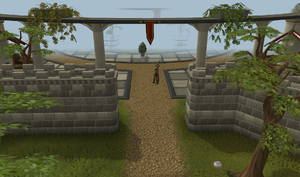
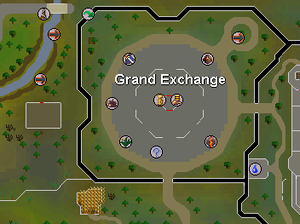
The Grand Exchange is located northwest of Varrock. There are many ways to get there, including:
- Walking from Varrock (with or without use of the Varrock Teleport spell).
- Teleporting to the air altar using the air altar teleport then walking to it.
- Using the tunnel northwest of the Grand Exchange (requires membership and level 21 agility).
- Using a canoe Station (requires level 12 woodcutting) to travel to either the Champion's Guild station or Barbarian Village station or Edgeville station and walking north, east or using the tunnel mentioned above.
- Using the mine cart northwest of the Grand Exchange (requires membership and having started the quest The Giant Dwarf).
- Using the spirit tree northeast of the Grand Exchange (requires membership and having completed the quest Tree Gnome Village).
- Using the fairy ring with the code "DKR" (requires membership and having access to the fairy rings from the quest Fairy Tale Part II).
- Using the spell Varrock Teleport, or a Varrock Teleport tablet after changing its destination to south of the Grand Exchange (requires membership and having completed one set of Varrock Tasks).
- Using a charged Ring of Wealth's teleport, which teleports you to the Grand Exchange entrance.
- Using a charged Ring of Duelling to teleport to Mobilising Armies then using the spirit tree nearby to teleport to the North-east part of the Grand Exchange.
- Using the Edgeville Lodestone and going through the north-west underwall tunnel.
NPC Informants
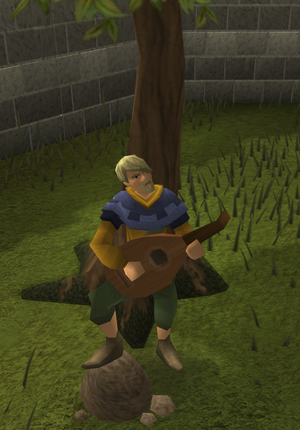
Around the Grand Exchange are five characters who shows the current prices of various items.
- Farid Morrisane shows the prices of ores.
- Relobo Blinyo shows the prices of logs.
- Bob Barter shows the prices of herbs. He also decants potions into full and empty vials. He can decant potions even if they are noted.
- Murky Matt shows the prices of runes. He also "decants" charged items into full and empty charges.
- Hofuthand shows the prices of certain weapons and armours. (See picture for details.)
Item sets
Most armour sets and the dwarf multicannon can be assembled into sets to save space. They behave like ordinary items except that they cannot be worn or used until they are disassembled. Only the Grand Exchange clerks can assemble and disassemble sets, and they will do this an unlimited number of times for free. Right-clicking a set and selecting "destroy" will not disassemble it.
Pricing
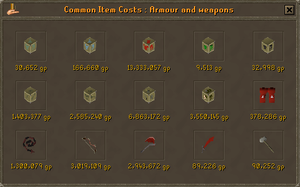
Prices are partly governed by the Laws of Supply and Demand:
- If an item is in high demand with low supply, then its price will increase.
- If an item is in low demand with high supply, then its price will decrease.
- If an item's demand matches its supply, then its price will stay the same.
Jagex has never published the Grand Exchange's exact pricing algorithms, although there are some reasonable guesses. By using the laws of supply and demand, the prices of items are updated depending on its recently traded prices and volume. For items with low volume such as partyhats, their prices update every few days or even once a week. Jagex can also intervene and set the prices themselves, and they reserve the right to intervene when they believe price manipulation is occurring on an inexcusable scale.
Because of an update on 1 February 2011, there are no longer trade restrictions, however there are guide prices and buttons to increase or decrease your offer on the item by 5%, as well as set a custom offer.
Trading Tips
For the Runescape Wiki price guide, see Grand Exchange Market Watch.
- Worlds 1 and 2 are popular worlds for trading items without using the Grand Exchange, especially items such as Partyhats.
- Competing offers in the same price range are prioritized chronologically, so making offers early will grant availability to have your items bought/sold before anyone else.
- All offers are completed using the earlier offer's price. In other words, when the buyer's price is above the seller's price, the trade is completed using the earlier offer's price, so also consider making your offers later.
- To bargain, you can wait to see whether your offer is accepted and then change your price accordingly.
- Price manipulation is possible even with the Grand Exchange, so be careful. (See section Price Manipulation below for details.)
- Changing the buying offer of a product by +%5 will generally increase the chance of buying quickly, the same is true while selling an item at -%5 the usual price.
Trade Restrictions
All trade restrictions are intended to reduce price manipulation, real-world trading, and/or unfair interactions between players with different levels. On the issue of price manipulation, Jagex said, "We are keen to keep a player-driven economy, so the prices are worked out using the supply and demand rules above. We will only intervene as a last resort, and only if we think price manipulation is going on, although the system has lots of safeguards to prevent that."<ref>Jagex. Controls - The Grand Exchange. RuneScape Game Guide.*</ref> Trade restrictions are those safeguards. On 1 February all price (but not necessarily trade) restrictions were removed. Trial members have a trade restriction on the grand exchange of 50 of certain items. This prevents new accounts from being made simply to use the 6 Grand Exchange slots available to members, for merchanting/flipping.
Buying and selling rates
Buying rate is restricted to a certain quantity every 4 hours.
template = Limit lookup form = lForm result = lResult param = 1|Item|Yew logs|string|
This text will disappear if the form is loaded properly.
|
This text will disappear if the form is submitted.
|
Some items have a connected limit, meaning that you can only buy a certain amount of either item, or a mix of the two up to a particular point.
- Metal armour (bronze through rune) share a limit of 100 between the pieces that make up the armour sets, although bronze through adamant platebodies have a separate limit of 500.
- Dragon armour shares a limit of 10 between all set pieces.
- Dragonhide armour of the same color, including sets (although the sets have a limit of 100).
- Treasure Trails armour that makes up a set shares a limit of 2.
- Barrows armour shares a limit between repaired pieces, broken pieces, and the item sets of the same brother's armour.
- Poisoned and unpoisoned versions of weapons and ammunition.
- All parts of godswords (swords, hilts, blades, shards)
- Both types of chinchompas.
- Enchanted and unenchanted gem-tipped bolts.
- All doses of the same kind of potion (with the exception of prayer renewal)
Tradeable items that cannot be traded using the Grand Exchange
Some items cannot be traded using the Grand Exchange, but they can still be traded using the traditional player-to-player trade. The list includes:
- Burnt food .
- Items from the quest Shield of Arrav: half certificate, phoenix crossbow, and weapon store key.
- Items from the quest Heroes' Quest: miscellaneous key and Pete's Candlestick.
- Most items from the shopkeeper Faruq in Al-Kharid: magic skullballs, marker seeds, and voting hat.
- Ogleroot from the activity Vinesweeper.
- Cursed magic logs from the Spirit Realm.
- Ancient artefacts (Revenant drops) from the former PvP Worlds and Bounty Worlds.
- Partially charged items: amulet of glory (1-3), games necklace and ring of duelling (2-7), pharaoh's sceptres (1-2) and black masks (1-9). Remember that Murky Matt can transfer charges around to make full and empty charged items.
- Gnomeballs.
- Afros obtained from Party Pete .
- Weeds obtained from farming .
- Coins.
- Double eyepatch.
- Items purchased from Diango in Draynor Village.
- Lapis Lazuli Brooches, obtained using the Dwarven Army Axe.
- Most armour sets.
- Iron sickle from Kingdom of Miscellania
- Partially full Flasks : Saradomin Brew Flask 1-5, Attack Flask 1-5, etc.
- Bronzed dragon claws
Economic Effects
The Grand Exchange replaces genuine merchants
The Grand Exchange has made merchanting almost obsolete, by decreasing the transaction cost for selling or buying, the time investment required, and the skill needed to make sale. Transaction cost is the cost of finding someone to trade with, bargaining and enforcing a trade agreement, and transferring the agreed goods and/or services. The list below illustrates how the grand exchange does this.
- Unlike a shop or player, the Grand Exchange does not make a profit.
- The Grand Exchange finds someone to trade. It searches every offer on every world. This has a drastic effect on the prices of many common items. For example, if you have to find a buyer yourself, items like bones are worth very little (no more than 10 coins, more often than not 1 or 2 coins). With the Grand Exchange, the common marketplace makes them worth 105 coins. The same effect can happen in reverse, where a greatly varied price becomes either a much lower or a much higher uniform price.
- The Grand Exchange replaces bargaining. If the buyer bids higher or equal to the seller’s asking price, then the Grand Exchange instantly completes the trade. If not, then it doesn’t. This removes any negotiations on price between players and leaves the transaction as a cut and dried sale or no sale, much more like a shop. On the other hand, to a certain extent bargaining is achieved; if a player realizes that an offer is not completing for a certain price, they may lower the selling price or raise the purchasing price.
- Time taken selling is greatly reduced. It is worth noting that not only is the trade normally completed in much less time, and item waiting to be sold on the Grand Exchange takes up none of the players time, as the player is not involved in the transaction. Whilst attempting to sell items to players, a time and skill investment is needed to sell items to make a profit- on the grand exchange it takes next to no time and no ability whatsoever.
- The Grand Exchange transfers the items halfway. Although a player still has to bring the items to the marketplace, the Grand Exchange will bring completed offers straight to the collection box (at any bank).
This of course is still only true for when the Grand Exchange prices match the items' intrinsic value. Although this is almost invariably true, in situations where an item is worth more or less than what it is worth on the grand exchange, merchants can still do business.
Price manipulation
Every price manipulation uses deception and/or coercion, which is why it is considered wrong to intentionally manipulate prices. Price manipulation is generally considered to have two main types and several subtypes; they are categorized differently because they work somewhat differently (the fact that they work somewhat differently is why more than one solution is needed). The two main types are disclosure-based manipulation and trade-based manipulation.
Disclosure-based manipulation
This occurs where a person discloses false or misleading information which has the effect of misleading other participants about the value or trading volume of a security. Every trade-able item in RuneScape is a security. Disclosure-based manipulation is fraud.
Pyramid scam
How some merchant clan leaders use a pyramid scam on people, in five steps:
- Some merchant clan leaders secretly buy lots and lots of the same item.
- They recruit and mislead people into buying the same item at a higher price, thus raising the item's price.
- They encourage people to recruit even more people, thus creating a pyramid.
- They set a "dump price" for everyone to sell.
- They either secretly sell their item before this dump price is reached, or they suddenly announce a new dump price; in both cases many people are still buying the item. What these people are misled into buying is the item they are secretly or suddenly dumping.
The merchant clan leader (and any of his or her trusted friends/ranks in the clan) may make millions of coins in this way. They'll set the price of for example, 1,000 coins per item, to be dumped at 10,000 coins. They themselves will buy the item for 1,000 - 1,200 coins each and wait until it rises to 5,000 coins, and they'll sell the items. If the clan is big, this won't affect their merchant, or they can blame another clan.
Trade-based manipulation
"This is the buying or selling of a security by a person [or group] which misleads or deceives other participants about the value or trading volume of that security.” It has many subtypes, but only two significantly damage the Runescape economy: matched orders and corners.
Matched orders, pools, and wash sales
Someone places an order to buy, and matches it with an order to sell: the buyer and seller are the same person. This transaction is fake because nothing is really being transferred. Matched orders manipulate prices by faking a supply and demand. A group can do this too.
Matched orders also mislead other people into overestimating the trading activities of the security that’s being manipulated, and thus—for slightly technical reasons—mislead them into underestimating the transaction cost of that security.
Matched orders and genuine orders are currently nearly impossible to differentiate on Runescape. We can only imagine account #1 posting an order to buy a dragon pickaxe for an unusual price, and account #2 selling it for a similarly unusual price. Repeated enough times and the price isn’t so unusual anymore, and that’s when the manipulation succeeded. We can also only imagine 2 million lobsters being bought and sold for the same price on the Grand Exchange, and so the Grand Exchange accounts for those numbers when it updates the price of lobsters, but the Grand Exchange currently doesn’t know whether the buyers and sellers were the same person. We don’t either. Again, matched orders and genuine orders are currently nearly impossible to differentiate on Runescape.
This is no longer possible because the Grand Exchange works such that buyers get the best offer , and sellers get the best offer they can get.
Corners or squeezes
Someone buys something, raises its price, and then sells it to another person. In this transaction, a cornering merchant intends to raise price by merely monopolizing his or her competitors, whereas a genuine merchant intends to raise price by at least decreasing the overall transaction cost. (Transaction cost is the cost of conducting a trade: the time and effort of finding someone to trade with, bargaining and enforcing a trade agreement, and transferring the goods and/or services.) Corners manipulate prices by monopolizing a security in a way that increases its overall transaction cost, and this additional transaction cost burdens other buyers but not the manipulator. Again, a group can do this too.
A corner is where “a person [or group] buys up a substantial volume of a security knowing that other market participants will be forced to buy from him at a higher price.”. Other buyers are forced to buy from a cornering merchant because they are left with few alternatives; the manipulator had already monopolized his competitors. By contrast, other buyers are not forced to buy from a genuine merchant because of two reasons: first, a genuine merchant often has competitors or the threat of potential competitors; second and most importantly, a genuine merchant saves them some trouble of finding someone to trade with, bargaining and enforcing a trade agreement, and transferring the goods and/or services.
Scamming
There continues to be much activity around the Grand Exchange as a main area for some players to operate scams, manipulate other players into giving away items or money and the age-old luring of players to areas they can be killed and their items taken.
Alternate Views on Price Manipulation
Some players argue that price manipulation is legitimate when not directly misleading other players. For example, while few would defend pyramid style clan manipulation, many would argue that solo merchandising with the effect of price manipulation is valid.
A common justification is that buyers and sellers have final say of their decision to make a transaction. Players buy items for what it is worth to them, and are aware of the price they are offering.
Legitimate Grand Exchange Merchandising
Legitimate merchandising on the Grand Exchange is not impossible, although which methods are considered legitimate is a matter of opinion.
Legitimate methods include investing in an item at a low price and waiting for the price to rise after a time before selling. Flipping can also be legitimate as arguably convenience is provided as a service to the buyers and sellers. For example, the seller is impatient to sell rune plate-bodies, and therefore prices them low. The merchant buys the rune plate-bodies from the seller, providing convenience to the seller in exchange for the potential to profit. The merchant then sells the rune plate-bodies to an impatient buyer, thus providing convenience as a service.
Price manipulation may occur if flipping is done in bulk, either unintentionally as a side affect, or intentionally as a means of increasing profits.
History
Trivia
- On Thanksgiving of 2010 the Grand Exchange database had a bug. This bug showed items graphics not displayed correctly.
- When the Grand Exchange was made public, many players were angry that the prices were set unfairly, since the "old style" of selling valuable items required much more time and effort.
- The maximum offer is 2,147,483,647 coins or simply 231 - 1 coins. This is the maximum value of the Java
inttype in 32 bits. If a player sets a price above this value, the price will simply say "Too high!". - On 1 July 2008, the HD graphical update prevented the progress bar of some players' trade offer from changing colour whenever the offer was completed or cancelled. This was fixed after the RuneTek 5 engine update.
- When Stealing Creation was released, the sacred clay arrows were listed on the Grand Exchange even though they cannot exist outside the activity.
- On 9 June 2009, a bug muted the Grand Exchange bankers and clerks, but players could still access the Grand Exchange through the desk.
- On 26 August 2009, items became collectable as notes.
- On 17 September 2009, two bankers and two clerks were "fired" by Mod Alan because the multiple bankers and clerks created redundant right-click options.
- On 8 November 2009, a bug in World 2 caused the Grand Exchange bankers and clerks to vanish for several minutes.
- On 10 November 2009, the Grand Exchange's desks had all options except "examine" removed, to prevent over-cluttering the right click menu.
- On 8 February 2010, a bug disabled the entire Grand Exchange except for the search box. Predictably, there were riots across RuneScape and rants on the official forums. A similar bug occurred on 10 April 2010.
- Familiars will not appear in the Grand Exchange, as it would worsen the already bad level of lag in the area. Instead, they will disappear and their timers will be frozen. Previously, familiars had to be dismissed before entering the Grand Exchange.
- It is often believed that JaGeX wished the set-out of traders to be similar to the set-out of the map (herbs in the south-west corner, weaponry and armoury in the north-west etc.) and that this was the initial reason for adding picture icons to the mini-map. However, few if any players use this method and prefer to site their trades in other locations at the Grand Exchange.
- There was once a glitch where visiting the Grand Exchange would add random players to your friends list. This was later fixed (these players were not actually random, but people who had talked recently and whose chat names were under the Grand Exchange item selection interface. This is related to the "click through" glitch that caused players to start walking to the floor tile directly behind the "X" button upon clicking it to close the Grand Exchange menu).
- The Grand Exchange clerks have a small role in Forgiveness of a Chaos Dwarf. The player asks for a set with several items that you need for completing the quest.
- On 2 July 2011 a huge rock appeared at the Grand Exchange. It had no use and it could not be examined or interacted with in any way. It was a teaser for the Clan Citadel update, and was removed when Citadels were added to the game.
- On 9 August 2011, there was a glitch where players could walk into the southern wall surrounding the Grand Exchange.
- The ground surrounding the Grand Exchange has graphical problems where grass sometimes shows through the tiles. This is probably caused by the two layers being in the same place as each other and so sometimes the game thinks the grass is closer to the camera.
- If players attempt to set up a cannon in the Grand Exchange, Brugsen Bursen will tell players "My area is for peaceful trading. Play with your toy somewhere else!". This indicates that Bursen is the the owner of the Grand Exchange.
- There is a glitch in the sets menu. Some of the icons have been pushed to the right. This has not been fixed.
- The Grand Exchange was updated for Christmas 2011 to resemble a winter theme.
- On the counter there are 2 Blurite Swords.
Gallery
-
A bug where bankers and clerks are missing before the layout update. Also an example of disclosure-based price manipulation: "Join clan x to make billions!"
-
Glitch causing items to be displayed as wire-frames.
-
A bug where players could search without being near the Grand Exchange.
-
Clerks' desks bearing the symbol of the elven goddess Seren before the layout update.
-
A very unbalanced needle.
-
A detailed image of the insides of a booth
-
A detailed image of the fountain in the center
-
The Entrance to the Grand Exchange during Christmas 2011
-
The center during Christmas 2011
References
See also
de:Große Markthalle no:Grand Exchange es:Grand Exchange nl:Grand Exchange fi:Grand Exchange pl:Grand Exchange

